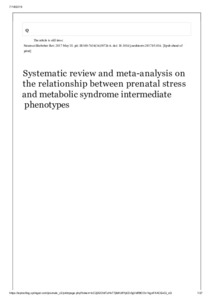Por favor, use este identificador para citar o enlazar este ítem:
https://repositorio.uca.edu.ar/handle/123456789/9597| Título: | Systematic review and meta-analysis on the relationship between prenatal stress and metabolic syndrome intermediate phenotypes | Autor: | Burgueño, Adriana Laura Juárez, Yamila R. Genaro, Ana María Tellechea, Mariana L. |
Palabras clave: | ESTRES PRENATAL; SINDROME METABOLICO; OBESIDAD; INDICE DE MASA CORPORAL | Fecha de publicación: | 2020 | Editorial: | Springer Nature | Cita: | Burgueño, A. et al. Systematic review and meta-analysis on the relationship between prenatal stress and metabolic syndrome intermediate phenotypes [en línea]. International Journal of Obesity. 2020, 44. doi:10.1038/s41366-019-0423-z Disponible en: https://repositorio.uca.edu.ar/handle/123456789/9597 | Resumen: | BACKGROUND: Metabolic Syndrome (MetS) can be considered as a consequence of a complex interplay between genetic and environmental factors and can be influenced by changes in the environment early in life. Prenatal stress (PS) exposure likely represents an important adverse intrauterine environment that may impact the biology of the developing organism. The aim of this study was to quantitatively synthesize the available data on the effects of PS on offspring's obesity, estimated indirectly by body mass index (BMI) and body fat; blood pressure, plasma glucose and blood lipid concentrations (triglycerides and high-density lipoprotein cholesterol). METHODS: Literature searches for eligible studies on PubMed were conducted until October 8, 2018. Full text review yielded 24 publications for inclusion into the systematic review. Meta-analyses were performed for the outcomes BMI and body fat. 62 effect sizes from 19 studies together with relevant moderators were collected. Summary estimates were calculated by using random-effects model. RESULTS: The combined standardized mean difference (d) for the relation between BMI and PS indicated that despite significant heterogeneity, stress exposure of expectant mothers was associated with increased BMI of their offspring [d (95% CI) = 0.268 (0.191; 0.345)]. Both objective and subjective stress have been linked to increased overweight. Preliminary results of the relationship between PS and body fat suggested that the contribution of PS to body fat should be at least further considered [d (95% CI) = 0.167 (0.016; 0.317)]. Evidence from a limited number of published studies do not sustains an effect on blood pressure, glucose metabolism or circulating lipids, however these outcomes have only been scarcely investigated. CONCLUSIONS: A direct association between PS and BMI was found and further studies are needed to confirm the relationship between maternal stress during gestation and body fat. Overall, findings suggest that PS could contribute to alterations to the post-natal offspring phenotype. | URI: | https://repositorio.uca.edu.ar/handle/123456789/9597 | ISSN: | 0307-0565 (impreso) 1476-5497 (online) |
Disciplina: | MEDICINA | DOI: | 10.1038/s41366-019-0423-z | Derechos: | Acceso abierto | Fuente: | International Journal of Obesity. 2020, 44 |
| Aparece en las colecciones: | Artículos |
Ficheros en este ítem:
| Fichero | Descripción | Tamaño | Formato | |
|---|---|---|---|---|
| systematic-review-meta-analysis.pdf | 812,66 kB | Adobe PDF |  Visualizar/Abrir |
Visualizaciones de página(s)
238
comprobado en 27-abr-2024
Descarga(s)
696
comprobado en 27-abr-2024
Google ScholarTM
Ver en Google Scholar
Altmetric
Altmetric
Este ítem está sujeto a una Licencia Creative Commons

